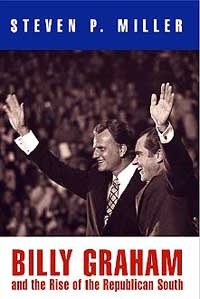Billy Graham and the Rise of the Republican South
University of Pennsylvania Press (2009)
Most Americans know Billy Graham as the nation’s most famous evangelist. But in Graham’s recent biography, author Steven P. Miller, Ph.D., argues that Graham — “a deceptively familiar icon” — did more than save souls in the decades following World War II; his influence helped create the modern South.

In his book “Billy Graham and the Rise of the Republican South,” Miller, adjunct instructor of history in Arts & Sciences, says that two of the most important narratives in recent Southern history are the end of Jim Crow laws and the beginning of the Republican Party’s hold on white Southern voters. “Graham was both a symbol of — and an agent in — both changes,” he said.
While white Southerners struggled to come to terms with civil rights legislation and Brown v. the Board of Education in the 1950s and ’60s, Graham welcomed all races to his rallies and preached racial harmony.
“His desegregated Southern crusades, held as early as 1953, provided a religiously comfortable way for some white Southerners to back away from the Jim Crow system,” Miller said.
Despite Graham’s “color-blind” racial ethic, he was not a crusader for civil rights. He criticized the protest tactics of Civil Rights Movement leaders and questioned the effectiveness of federal civil rights legislation.
Graham routinely defended the region in the face of outside criticism. His regional boosterism helped popularize the 1970s “Sunbelt” image of the South as a “modern, yet pious region that — so it was claimed — had moved beyond its tragic racial history,” Miller said.
Though Graham has acquired a nonpartisan image in recent decades, his involvement with Presidents Dwight Eisenhower and Richard Nixon contributed to the growth of the Republican Party in the South in the 1950s, ’60s and ’70s, Miller said.
“As a racial moderate who was beloved in his home region, Graham was extremely useful in Nixon’s efforts to win over white Southerners without directly endorsing their segregationist leanings,” Miller said. “Graham can be linked with the broader conservative shift in American political culture that only now might be coming to a close.”
Miller grew up in Stuarts Draft, Va., but his parents were from Pennsylvania. He said that as a child he didn’t consider himself a Southerner “per se.”
“I hope that the ‘in, but not of’ sensibility of my youth now enables me to offer a critical, yet empathetic perspective on recent Southern history,” he said.
Miller said he never saw Graham preach in person but experienced firsthand Graham’s influence on the region.
“As a child, I was exposed to many of the rituals of evangelical Christianity, including a few trips to the cinema to see movies produced by Graham’s association,” he said. “They always ended with a Graham altar call.”
— Jessica Daues